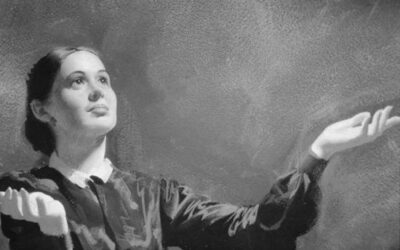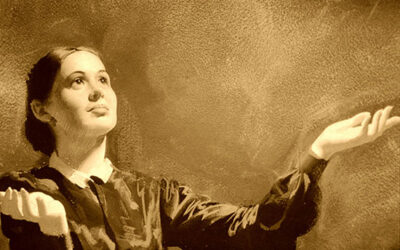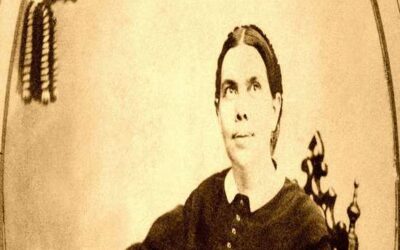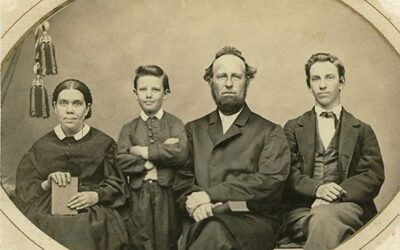The New Testament upholds prophecy as a spiritual gift that will continue to the end of time (Ephesians 4:11–14).
Seventh-day Adventists believe that Ellen G. White (1827–1915), a humble woman of God and an earnest student of the Bible, was a prophetess.
She received special guidance and insight from the Holy Spirit regarding the application of biblical principles to modern times, and also prophetic information about future events.
While Ellen White didn’t refer to herself as a prophet, she did claim to be a messenger of God. Her mission was to bring forgotten truths to light and provide spiritual counsel for fellow Christians, as well as the fledging Seventh-day Adventist denomination.
It’s natural to feel cautious or hesitant when we hear about a human being receiving prophetic messages from God. After all, Jesus Himself warned us about false prophets and their deceptions (Matthew 24:24). So our pause is natural, and encouraged. We’re supposed to test these things.
Thankfully, we can count on the Bible’s principles for recognizing a true prophet from a false prophet.
As we look at Ellen White’s ministry, we’ll see that it passes these tests of a true prophet. For this reason, Seventh-day Adventists trust her as a source of counsel, guidance, and comfort.
But don’t take our word for it.
In this article, you’ll be able to examine the following concepts yourself:
- The difference between visions and prophecies
- How Ellen White passes the biblical tests of a true prophet
- Her key visions and prophecies
- Visions in religious movements during the 1800s
What are visions and prophecies?
In the Bible, visions are one of the ways that God speaks to prophets and gives them messages. Through them, God reveals things that they would not otherwise be able to perceive, even faraway places or something supernatural.
A prophecy, on the other hand, is a message from God—often a prediction of the future (though not always). God may give this message through a vision or a dream or just His voice speaking to the prophet.
Here’s what the Bible says about prophecy:
“And we have the prophetic word more fully confirmed, to which you will do well to pay attention as to a lamp shining in a dark place…. For no prophecy was ever produced by the will of man, but men spoke from God as they were carried along by the Holy Spirit” (2 Peter 1:19–21, ESV).
In this verse, Peter refers to all of the Old Testament—the Scriptures at the time—as the “prophetic word.” In other words, the Bible consists of prophecies (messages) from God.
Some of those came through visions.

Photo by Sincerely Media on Unsplash
For example, the prophet Daniel recorded many prophecies—some from dreams (Daniel 7:1) and others from visions (Daniel 10:4–14).
The disciple John received the book of Revelation as a vision (Revelation 1:10–11), as indicated by the phrases “I turned to see” (verse 12), “I looked” (Revelation 4:1), and “appeared” (Revelation 12:1). He even saw the very throne of God (Revelation 4).
God also gave visions with messages for specific people. God spoke to Abraham through a vision (Genesis 15:1). He spoke to Samuel in a vision too, though it seems that Samuel only heard God speak but didn’t see Him (1 Samuel 3:10–14). The apostle Paul received a vision in which light from heaven suddenly blinded him and Jesus spoke to him (Acts 9:1–8).
Visions and prophecies seem to have a significant role in the work of biblical prophets.
But they aren’t the only criteria for a true prophet. The Bible has numerous tests that prophets must pass.
Let’s evaluate Ellen G. White against those tests.
Does Ellen White pass the biblical tests of a true prophet?
When she is measured against the tests of a true prophet, we find that, yes, she does pass them. In short, these tests are:
- Consistency with the Bible (Isaiah 8:20) and its teachings about Jesus Christ (1 John 4:1–3)
- Godly character (Matthew 7:16–20)
- Messages that promote godly change and don’t mix truth with error (2 Peter 2:1–3)
- Fulfilled predictions (Deuteronomy 18:20–21)
To learn more about these tests, see this article about the difference between a true prophet and a false prophet. The sections below will look at how Ellen White’s ministry harmonizes with each test.
Her teachings are consistent with the Bible

Photo by Aaron Burden on Unsplash
Ellen White upheld the writings of the Bible. Instead of setting herself up as the authority, she pointed to it as the ultimate standard.1 Her teachings are consistent with the Bible and its overarching themes of salvation and Jesus Christ.
In fact, the primary purpose of her prophetic messages were to get people to look at the Bible more closely!
Notice these quotes of her writings, in which she emphasizes how Scripture is ultimately where we should go for direction:
“There is need of a return to the great Protestant principle—the Bible, and the Bible only, as the rule of faith and duty.”2
“We should make the Bible our study above every other book; we should love it, and obey it as the voice of God.”3
“Lift up Jesus…lift Him up in sermon, in song, in prayer.”4
God gave her the gift of prophecy to point to the Bible. This role included confirming the Bible studies that led to Adventist doctrine.

Photo by Fumiaki Hayashi on Unsplash
Her life reveals the fruit of godly character
Ellen White was a woman of integrity, who lived what she taught. Her life of humility and Christlikeness revealed the fruit of the Holy Spirit (Galatians 5:22–23).
After her death, the editor of the New York Independent, a leading magazine at that time, wrote a tribute to her. Though he was not an Adventist nor a believer in her gift of prophecy, he said these words:
“She was absolutely honest in her belief in her revelations. Her life was worthy of them. She showed no spiritual pride and she sought no ‘filthy lucre.’ She lived the life and did the work of a worthy prophetess.”5
Her messages promote godly change and don’t mix truth with lies
God called Ellen White, like the Old Testament prophets Elijah, Jeremiah, and Jonah, to take unpopular stances and rebuke people who were in sin. She promoted changes that were sometimes very difficult for people to accept. In other words, if she was looking for popularity, respect, or exaltation…sharing these messages wasn’t going to provide much personal gain in those areas.
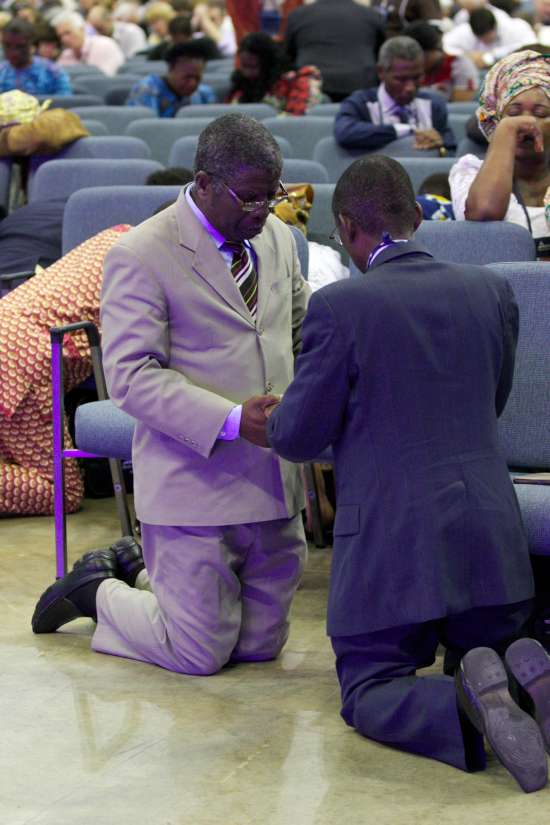 This responsibility was not easy, but she remained faithful even when people turned against her because of her messages.8
This responsibility was not easy, but she remained faithful even when people turned against her because of her messages.8
And being faithful to the truth meant all of the truth—not only the parts that she or others liked. Her messages didn’t contain hidden agendas or vague statements that could be misunderstood. Instead, they were plain messages that harmonized with the whole Bible.
Discerning between truth and lies was something Ellen White emphasized. She wrote this about the development of Adventist doctrine:
“We would search the Scriptures with much prayer, and the Holy Spirit would bring the truth to our minds. Sometimes whole nights would be devoted to searching the Scriptures, and earnestly asking God for guidance. … The power of God would come upon me, and I was enabled clearly to define what is truth and what is error.”9
Similarly, God’s Word was her guide for ensuring that her messages didn’t mix truth with error.
Her proclamations about the future came true
You are probably wanting to know whether or not Ellen White’s predictions came true. Though many of her visions did not contain predictions, those that did pass this test. Here are a few things she prophesied:
- the spread and popularity of modern spiritualism.10
- the start of the Civil War and that people in the Parkville Church would lose sons in battle
- the destruction by fire of the Review and Herald publishing house
Let’s get a rundown of her most well-known and influential visions.
Ellen White’s key visions and prophecies
Ellen White had many hundreds of visions in her lifetime. They included:
- predictions for the future
- scenes of last-day events
- insights on teachings of the Bible.
- counsels for churches
- practical advice on health and the Christian life
She wrote down many of them in letters, articles, pamphlets, and books.
Her first vision

Photo by Johannes Plenio on Unsplash
Ellen White’s first vision showed the people of the Advent Movement traveling to heaven with their eyes fixed on Jesus. It came as a comfort to the believers who had experienced the Great Disappointment in October 1844.
During the vision, the Holy Spirit showed her the Advent people on a narrow pathway, symbolizing their Christian journey (Matthew 7:13–14). The people had a bright light behind them, while Jesus went before them.
She also witnessed Jesus coming on a great white cloud (Revelation 1) and the people of God entering heaven and the New Jerusalem. There, they saw many of the things described in Revelation 21 and 22.
Her longest vision
Ellen White’s longest vision of nearly four hours took place in Randolph, Massachusetts, in 1845. During those hours, she held up a huge, heavy family Bible in one hand. While doing so, she recited text after text from it—as the finger on her other hand pointed to each text as she read. She couldn’t even see where her finger was pointing…but those observing could see that it was following the exact passage she was reciting at that time.
The vision also contained a very specific rebuke for two false teachers—Mr. Sargent and Mr. Robbins—and a prediction of their downfall.
Here’s the story.11
Sargent and Robbins had been promoting unbiblical teachings to Advent believers in Boston. They tended toward extremism, and they used Leviticus 25:11 to say that it was the time of “Jubilee” when the land should rest. Therefore, secular work was sinful and the people should sell everything to help the poor. They also claimed that Ellen White’s visions were satanic—and that she could not have them in their presence.
When she visited near Boston, she planned to come to Sargent and Robbins’s church gathering. The night before, however, God told her in a vision to go instead to a meeting in Randolph.
Why?
Sargent and Robbins had heard of her coming and moved their meeting to Randolph to avoid her. You can imagine their surprise when she arrived there—and even more so when she went into a vision.
The vision revealed Sargent and Robbins’s errors and accurately predicted that they would “continue to despise the teachings of the Lord” and “despise reproof.” A witness there that day writes that Sargent and Robbins later “made a wreck of all their faith in the doctrines taught in the Bible and then broke up and scattered.”
The Great Controversy vision
Ellen White had one of her most significant visions in Lovett’s Grove, Ohio, on March 14, 1858. In it, she saw an overview of the battle between Christ and Satan and the way it will impact God’s people at the end of time.12 God instructed her to record the vision in a book which became The Great Controversy.13
She considered this book one of the most important ones she’d written. This is the reason:
“It contains the story of the past, the present, and the future. In its outline of the closing scenes of this earth’s history, it bears a powerful testimony in behalf of the truth. I am more anxious to see a wide circulation for this book than for any others I have written; for in Great Controversy the last message of warning to the world is given more distinctly than in any of my other books.”14

Photo by Robert Linder on Unsplash
Prediction of the Civil War
On January 12, 1861, while at a church in Parkville, Michigan, Ellen White received a vision that foretold the Civil War.15 She said that many more states would join South Carolina in seceding and that the war would be long and brutal.
The timing of this prophecy is important.
South Carolina had seceded in December of 1860. Though three more states had seceded within four days of her prophecy, Ellen White probably didn’t know about them. War was not yet a major thought on people’s minds.
But a glance at the following years tells us that her predictions were spot on. The Civil War is still considered one of the most devastating wars in American history.
The health reform vision
On June 6, 1863, Ellen White was in Otsego, Michigan, when she received a vision about health. It warned against the use of alcohol, tobacco, and caffeinated drinks, while promoting a vegetarian diet and personal hygiene, among other things.16

Photo by Austrian National Library on Unsplash
What’s so significant is that she received this vision during a time when knowledge of medicine and health was primitive. Many of these ideas that seem like common sense today weren’t even considered back then.
Not until the late 1960s would doctors see the connection between cigarettes and lung cancer.17 And now, science attests that vegetarian and vegan diets are beneficial.
Dr. Clive McCay (1898–1967), a researcher and nutrition professor at Cornell University, read one of Ellen White’s books on health. He was so impressed that he purchased more of her books and lectured about her.18
Though not an Adventist, he wrote this about her:
“Her basic concepts…have been verified to an unusual degree by scientific advances of the past decades. Someone may attempt to explain this remarkable fact by saying: ‘Mrs. White simply borrowed her ideas from others.’ But how would she know which ideas to borrow and which to reject out of the bewildering array of theories and health teachings current in the nineteenth century? She would have had to be a most amazing person, with knowledge beyond her times, in order to do this successfully!”19
The gift of prophecy from the Holy Spirit is what provided her with this “knowledge beyond her times.”
Prediction of the publishing house destruction
In 1901, the Review and Herald, a Seventh-day Adventist publishing house in Battle Creek, Michigan, received a strong rebuke for losing sight of God and becoming focused on commercial work.20 Ellen White warned that “unless there is a reformation, calamity will overtake the publishing house.” She saw “an angel standing with a sword as of a fire stretched over Battle Creek.”21
But the publishing house didn’t make any changes to their goals or operations, and the prophecy came true when on December 30, 1902, the whole publishing house burned to the ground.22
As we’ve looked at Ellen White’s visions and their fulfillment, we must consider that she was not the only one receiving revelations from God during her time. What made her visions and prophecies different?
Visions in religious movements during the 1800s
Claims of visions and revelations from God were common in the 19th century as religious revivals spread across the United States. Examples of people who claimed to receive revelations from God are:
- Joseph Smith, the founder of Mormonism
- Ann Lee, a prominent figure in the Shaker movement
- Mary Baker Eddy, the founder of Christian Science
But their revelations related to the Bible very differently from those of Ellen White.
In 1820, Joseph Smith began having visions that he published in the Book of Mormon in 1830.23
What were its teachings?
The Book of Mormon says that visions supersede the Bible, which is full of translation errors.24 The Book also teaches unbiblical practices like polygamy and baptisms for the dead.25

Photo by Ralph (Ravi) Kayden on Unsplash
Around the time of Joseph Smith, Ann Lee was kindling the Shaker movement in the US. She taught that sexuality was the source of evil, meaning that people had to be celibate to remain pure.26 And based on one of her visions, she declared that she herself was the female part of God and the returned Christ.27
Then, Mary Baker Eddy came on the scene in 1866.
That year, after falling on an icy sidewalk, Eddy was not expected to live. But as she read a story of Jesus healing someone in the Bible, she was miraculously healed.28
From that time on, Eddy devoted her life to understanding healing and wrote a book called Science and Health with Key to the Scriptures. She founded the Christian Science Church in 1879.
The church believes that the only reality is God and that sickness all occurs in the mind. Healing can be achieved by subduing the mind and believing in Christ’s healing.29 Another distinct belief is that Jesus is not God, only godlike.
In her religious journey, Eddy received visions and dreams, which her secretary Calvin Frye recorded in a book called Visions of Mary Baker Eddy. They describe her religious journey and support the beliefs of the church.
So how do the teachings of these individuals stand up to the Bible? Many of them contradict very clear passages.
Look at these examples:
| Teaching | Bible Passages It Contradicts |
| Visions supersede the Bible | 2 Peter 1:16–21; Luke 16:31 |
| Baptisms for the dead | Matthew 28:19–20; Mark 16:16 |
| Celibacy is necessary to remain morally pure | Matthew 19:4–6; Hebrews 13:4 |
| Reincarnated Christ figures walking among us | Acts 1:11 |
| Jesus is not God | John 1:1–3, 14; 10:30–33; Colossians 1:15–16 |

Photo by Samantha Sophia on Unsplash
Using the Bible’s own tests of a true prophet, we can’t accept these teachings nor the prophetic claims of those who taught them.
It’s true that these people said some things that were in agreement with the Bible. But there was always a point where the message deviated. They ultimately undermined the Bible and its truths, while Ellen White did the opposite. She upheld them.
Ellen White’s visions and prophecies lead us to the Bible
We’ve seen how Ellen G. White’s visions and prophecies came true with accuracy.
But fulfilled predictions are only one type of evidence for the biblical gift of prophecy.
That’s where the other tests of a true prophet come in. They help us to see that her ministry lines up with the Bible and reflects the fruit of the Holy Spirit. Furthermore, she never sought popularity or favor; instead, she faithfully shared the truths of the Bible even when opposed.
Her visions also were accompanied by physical signs similar to those of prophets in the Bible:
- Falling to the ground (Numbers 24:4; Revelation 1:17)
- Being unconscious of surroundings and going to faraway places (2 Corinthians 12:2–4)
- Receiving supernatural strength (Daniel 10:16–19)
- Not breathing (Daniel 10:17)
Likewise, when she received visions while people were around her, she would become oblivious to her surroundings. Sometimes she would move freely, and not even the strongest person could stop her. Regardless of whether the visions lasted 15 minutes or 3 hours, she didn’t breathe, as confirmed by doctors that examined her.
Her son wrote the following about his mother’s experience:
“As she was praying, I heard that shout, Glory. There is nothing like it—that musical, deep shout of Glory. She fell backward. My father put his arm under her. In a little while her strength came to her. She stood up in an attitude of one seeing wonderful things in the distance, her face illuminated, sometimes bright and joyous.”30
Because Ellen White meets these biblical tests, the Seventh-day Adventist Church accepts her gift of prophecy. Through the years, she has continued to support and guide the church to the truth in Jesus.
- Douglass, Herbert, Messenger of the Lord (Nampa, Idaho, Pacific Press, 1998),p. 135. [↵]
- White, Ellen, The Great Controversy (Pacific Press, Mountain View, CA, 1911), p. 204. [↵]
- White, Ellen, Christian Education (International Tract Society, Battle Creek, MI, 1894), p. 109. [↵]
- White, Ellen, Gospel Workers (Review and Herald, Washington D.C., 1915), p. 160. [↵]
- Independent, August 23, 1915, quoted by Spicer, William, The Spirit of Prophecy in the Advent Movement (1937), p. 126. [↵]
- Douglass, pp. 135–136. [↵]
- White, Willie C., “The Visions of Ellen G. White,” Dec. 17, 1905. [↵]
- White, Ellen, Christian Experience and Teachings of Ellen G. White (Pacific Press, Mountain View, CA, 1922), p. 78. [↵]
- White, Ellen, Gospel Workers (1915 ed.), (Washington, D.C., Review and Herald, 1915), p. 302. [↵]
- Coon, Roger W., The Great Visions of Ellen G. White (1992), p. 51 [↵]
- Ibid., pp. 25–37. [↵]
- Ibid., p. 67. [↵]
- Ibid., pp. 271–272. [↵]
- White, Ellen G., Letters and Manuscripts, vol. 20, Letter 281, 1905. [↵]
- Coon, p. 82; White, A. L., Ellen G. White: The Early Years: 1827–1862, vol. 1, (Review and Herald, Hagerstown, MD, 1985), p. 462–463 [↵]
- White, Ellen, Spiritual Gifts, vol. 4a, ch. 39. [↵]
- Robert N Proctor, “The History of the Discovery of the Cigarette–Lung Cancer Link,” Tobacco Control, vol. 21, no. 2, 2012, pp. 87–91. [↵]
- Nichol, Francis D., Why I Believe in Mrs. E. G. White, 1964, p. 57. [↵]
- McCay, C. M., A Nutrition Authority Discusses Mrs. E. G. White, (Review and Herald, 1959), p. 10. [↵]
- White, Ellen, Publishing Ministry (Review and Herald, Hagerstown, MD, 1983), p. 170. [↵]
- White, Testimonies for the Church, vol. 8 (Pacific Press, Mountain View, CA, 1904), p. 97. [↵]
- Olson, R. W., Ellen White’s Predictions, (Ellen G. White Estate, 1989), p. 7 [↵]
- Douglass, p. 38. [↵]
- “Mormon Scripture,” MormonBeliefs.org; “Scripture—The Mormon Holy Books,” BBC, Oct. 8, 2009. [↵]
- White, Arthur L., Ellen White—Messenger to the Remnant, (1969), p. 27. [↵]
- Douglass, p. 37. [↵]
- “Ann Lee,” Encyclopedia Britannica, Sep. 4, 2021 [↵]
- “What Is Christian Science?” Christian Science, christianscience.com. [↵]
- Ibid. [↵]
- White, Arthur L., Ellen G. White, the Early Years (1827-1862), p. 471. [↵]
More Answers
8 Pieces of Advice from Ellen White’s Counsel for Families
8 Pieces of Advice from Ellen White’s Counsel for FamiliesFamily—it can be the source of the most wonderful and frustrating parts of life. And it’s in the family that individuals develop their identities and learn the behaviors that either propel them forward or...
Ellen G. White’s Counsel on College Education
Ellen G. (Harmon) White, a significant co-founder of Adventism, is often known for her practical and spiritual guidance for proper childhood education. But she was also significantly involved in the development of Seventh-day Adventist higher education.
Ellen G. White or the Bible—Which is More Important to Adventists?
The Bible—without a shadow of a doubt—is the most important book. It’s the standard we use to test all other writings, including those of Ellen White.
Do Adventists Worship Ellen White?
Ellen White was a co-founder and leader in the Seventh-day Adventist Church from its beginning. Adventists believe that she had the prophetic gift (Ephesians 4:14; 1 Corinthians 12:28) and passes the biblical tests of a prophet.
Ellen White and the Sabbath
The Sabbath is an important topic in the Seventh-day Adventist Church. It shouldn’t surprise you, then, that Ellen G. White, a co-founder of the church, studied the Bible’s teachings on the Sabbath and wrote large amounts about it.
Are Any of Ellen G. White’s Prophecies Yet to Come True?
Yes. Some prophesied events have yet to happen. Ellen White, a co-founder of the Seventh-day Adventist Church, demonstrated many times over that she had the spiritual gift of prophecy (1 Corinthians 12, 14). Some of her predictions’ timelines have already passed, and those prophecies have been fulfilled.
What Ellen G. White Said About Using the Bible in Education
Ellen White, one of the founders of the Seventh-day Adventist Church, believed that education was not complete unless it was founded upon the principles of the Bible.
Ellen G. White’s Counsel on Christian Education
Ellen White, a co-founder of the Seventh-day Adventist Church, saw that the educational system during her time was lacking and looked for ways to improve it—not only in the United States but throughout the world. And as part of her life of ministry, she sought out practical ways to be better stewards of our minds, bodies, and the lives we’re given.
What Was Ellen G. White’s Counsel on Music?
At its core, music is a collection of tones, sounds, and rhythms that creates a melody. It’s also much more than that.
How Ellen White’s Teachings Can Improve Your Health
Healthcare in the nineteenth century was said to leave “more disease than it took away” with its use of bloodletting and “medicines” like mercury and arsenic. As people questioned these methods, new approaches popped up. But which ones were reliable?
Ellen White’s Spiritual Counsel on Marriage
As one of the founders of the Seventh-day Adventist Church, Ellen G. White was held in high regard. She was a prolific author and was heavily engaged in the mission of the denomination, prayerfully pursuing the guidance of the Holy Spirit.
Were All Ellen White’s Books Inspired?
As the most translated female author in the world, Ellen White wrote numerous books, articles, pamphlets, and more. These writings focused on developing Christian character, emphasizing Bible truth, practical tips for living well and staying healthy, and discussing effective methods of delivering the gospel message to the world.
What is the Spirit of Prophecy?
The Spirit of Prophecy, one of the spiritual gifts of the Holy Spirit, is described as “the testimony of Jesus” (Revelation 19:10) and, according to Belief 18 of the 28 Adventist Fundamental Beliefs about Scripture, it will be one of the distinctive characteristics of the remnant of devout believers in the end times (1 Corinthians 14:1-5; Revelation 19:10; Revelation 12:17).
How Ellen White Influenced the Adventist Health Message
Seventh-day Adventists are known for their emphasis on healthy living. And Ellen G. White was a significant influence in the development of this priority and practice among Adventists.
What Did Ellen White Say About End-Time Prophecy?
We can read in Scripture about the series of events and signs that lead up to the second coming of Jesus Christ. And it sounds pretty intense, to say the least. The symbolic nature of the language of prophecy also can make things tricky to understand at first.
What Were Ellen White’s Visions About the Adventist Church?
Led by the Holy Spirit, Ellen G. White was given many messages, counsel, revelations, and visions about the Bible, history, prophecy, and how we can apply biblical principles to our daily lives.
Ellen G. White’s Travels and Worldwide Mission
Though Ellen White, a co-founder of the Seventh-day Adventist Church, is best known for her ministry in the United States, she also traveled to twelve other countries in her lifetime—a big accomplishment in the 19th century when travel was strenuous and long.
Were All Ellen White’s Visions About the Future?
While the visions God gave Ellen White were often about the distant future or last-day events, she had many others that addressed different topics. They may not be discussed as much as her visions about the Second Coming or the End Times, but they tackled some timely topics for her day.
Ellen White and Adventist Healthcare—Ahead of Their Time
Medical care in the mid-1800s was primitive, to say the least. Basic concepts we take for granted—such as proper handwashing or recognizing the dangers of bloodletting—were nonexistent. And doctors often had little more than nine months of training!
What is the Spirit of Prophecy (Books 1–4) by Ellen G. White?
Applying biblical prophecy to history, recent events, and especially the future, can be a daunting task. Even a little scary for some. But even so, we can’t help but want to know more. We want to be prepared—to feel like we know how to weather the storm.
What Did Ellen White Teach About Vegetarianism?
One thing you might have heard about Seventh-day Adventists is their emphasis on a vegetarian lifestyle. If you’re wondering why that is, it goes back to our church’s humble beginnings:
What Does Ellen White Say About Prayer?
Have you ever had a burden you just had to tell someone, but you were afraid of being judged if you did? Ellen G. White, an important figure in the Seventh-day Adventist Church and a prolific writer, described prayer as talking to God in a personal way—He’s the friend we can tell everything to.
Who Were Ellen White’s Children?
Being the children of a woman with a prophetic calling from God had its blessings and its challenges.
In this overview, we’ll look at the highlights of the lives of Ellen White’s sons during her many years of ministry, as well as the ways each of them decided to serve Jesus Christ:
Steps to Christ: A Guide to a Relationship with Jesus
Whether you’re just starting your journey with Jesus Christ, are coming back after some time away, or have had a relationship with Jesus for years, using a book—in addition to the Bible—to guide or supplement that relationship can be helpful, comforting, and joyful.
How Can I Know Ellen White’s Messages Were From God?
It’s natural to be a bit skeptical when you hear about someone being “divinely inspired,” or that something is a “message from God,” etc. And we expect nothing different if you’re hearing about Ellen White, an influential co-founder of the Seventh-day Adventist Church, for the first time. After all, the Bible tells us that we’re supposed to test these things!
Was Everything Ellen White Said Divinely Inspired?
The Seventh-day Adventist Church believes that many of Ellen White’s messages were inspired by God. But that doesn’t mean everything she ever said was prophetic, or meant to be taken as direct instruction from God.
Ellen White and the Great Controversy
The Great Controversy is a book written by Ellen G. White, a co-founder of the Seventh-day Adventist Church. Written in the late 1800s, the book is the last in a series and describes the connection between Bible prophecy and post-biblical history. It also discusses factors that will characterize last-day events.
Was Ellen G. White Really a Prophet?
Seventh-day Adventists believe that Ellen G. White fits the Bible’s definition, description, and criteria of a true prophet. Her words and deeds have stood the test of time and always glorified God and the Bible above all else.
How Did Ellen G. White Help Found the Adventist Church?
Ellen G. White, a humble woman from Gorham, Maine, was a co-founder of the Seventh-day Adventist Church and a key leader in it from its very beginning. Following the Holy Spirit’s guidance at a young age, she dedicated herself to studying Scripture and became involved in the Advent Movement.
Didn’t find your answer? Ask us!
We understand your concern of having questions but not knowing who to ask—we’ve felt it ourselves. When you’re ready to learn more about Adventists, send us a question! We know a thing or two about Adventists.
















